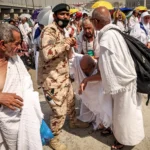In the rich tapestry of Islamic tradition, the story of Prophet Ibrahim’s (Abraham), peace be upon him, willingness to sacrifice his son stands as a profound testament to unwavering faith and ultimate devotion to Allah. This narrative, commemorated annually during Eid-ul-Adha, provides us with deep insights into the essence of true devotion and submission to the divine will. As Muslim parents, understanding and conveying this story to our children can offer invaluable lessons in faith, trust, and obedience.
The Story of Prophet Ibrahim’s Sacrifice
The Quran recounts the profound moment when Prophet Ibrahim, received a divine command (in his dream) to sacrifice his beloved son, Ismail (Ishmael), peace be upon them. This was a test of his faith and devotion. Despite the enormity of the command Prophet Ibrahim prepared to fulfill it without hesitation – demonstrating his complete trust in Allah’s wisdom. And as the story goes, when Ibrahim was about to perform the sacrifice, Allah intervened, providing a ram to be sacrificed instead, thereby sparing Ismail.
This story is immortalized in the Quran:
“And when he reached with him [the age of] exertion, he said, ‘O my son, indeed I have seen in a dream that I [must] sacrifice you.’ He said, ‘O my father, do as you are commanded. You will find me, if Allah wills, of the steadfast.'”
(Surah As-Saffat, 37:102)
The Essence of Devotion
For those who struggle to grapple with the idea of what unwavering devotion is, it may seem as if Allah deliberately puts His servants through hardships. This perspective can lead to a misunderstanding, where one might miss out on the aspect of His supreme mercy.
It is crucial to recognize that Allah’s tests are not meant to cause unnecessary suffering, but rather to strengthen our faith and bring us closer to Him. Each test is a manifestation of Allah’s mercy and wisdom and it is through these trials that we are given the opportunity to demonstrate our faith, resilience, and commitment to His path in a number of distinct ways:
1. Understanding Divine Wisdom
Allah’s wisdom is beyond human comprehension. What may appear as a hardship is often a means to achieve a greater good. Prophet Ibrahim’s, peace be upon him, test was not just about the act of sacrifice, but about proving his unwavering devotion and complete submission to Allah’s will.
2. Recognizing Mercy in Disguise
Hardships can be a form of Allah’s mercy, designed to purify us, expiate our sins, and elevate our spiritual status. They teach us patience, reliance on Allah, and help us grow stronger in our faith.
3. Seeing the Bigger Picture
In the story of Prophet Ibrahim, peace be upon him, Allah’s substitution of a ram to sacrifice instead of Ismail is a powerful reminder of His mercy. It shows that Allah does not desire hardship for us; rather, He wants to see our willingness to obey and trust Him, and ultimately, He provides relief and reward.
Bearing these lessons in mind, we can help ourselves and our children understand the core values of complete trust, unconditional obedience, and the spirit of sacrifice by way of;
4. Having Complete Trust in Allah
Prophet Ibrahim’s, peace be upon him, readiness to sacrifice his son illustrates the highest level of tawwakul or trust in Allah. It teaches us that true devotion involves complete reliance on Allah’s wisdom and plan, even when faced with the most challenging tests. This unwavering trust is a cornerstone of faith, reminding us that Allah’s wisdom surpasses human understanding.
5. Obeying Unconditionally
The story emphasizes that devotion to Allah requires unconditional obedience. Neither Prophet Ibrahim, nor his son Ismail, peace be upon them, questioned the command but was prepared to carry it out, demonstrating that true devotion means submitting to Allah’s will without hesitation or doubt, even when it involves personal sacrifice.
Translating These Lessons to Our Children
Once there is a clear understanding, it is important to make use of the opportunity (of the teachable moment) that comes to us every year, in the month of Dhul Hijjah – leading into Eid-ul-Adha, and convey these lessons to our children. Be sure to capitalize on these points:
1. Instilling Trust in Allah
Share stories from the Quran and Sunnah that highlight Allah’s wisdom and mercy. Encourage your children to turn to Allah in times of need and to trust in His plans, reinforcing the idea that Allah knows what is best for us.
2. Modeling Obedience and Devotion
Demonstrate through your actions what it means to be obedient to Allah’s commands. Engage in regular prayers, fasting, and other acts of worship, showing your children that devotion to Allah is a lifelong commitment.
3. Emphasizing the Value of Sacrifice
Teach your children about the importance of making sacrifices for the greater good. This can be through small daily acts of kindness and generosity, or through larger commitments, such as volunteering and helping those in need.
4. Creating Opportunities for Reflection
Encourage your children to reflect on the story of Prophet Ibrahim, peace be upon him, and its lessons. The whole of Hajj offers opportunities to open stories on many aspects of his life, the life of his family, and the legacy of his prophethood. Discuss what it means to us as Muslims and how they can apply these lessons in their own lives.
The story of Prophet Ibrahim’s, peace be upon him, sacrifice is more than a historical event; it is a timeless lesson in true devotion to Allah. By understanding and embodying the principles of trust, we can cultivate a deep and meaningful relationship with Allah. More importantly, as parents, it serves as our rightful responsibility to pass these lessons on to our children, guiding them to become devoted and faithful individuals through our actions and teachings. So let us grasp the profound beauty and significance of true devotion, making the occasion of Eid ul-Adha even more meaningful and worthy of celebrating.
By Umm Ahmed
Umm Ahmed is an early childhood educator and mother of three boys. Always on the quest to learn, she is passionate about seeking knowledge and passing it on to others. A writer in the making, she draws inspiration through deep conversations, laws of nature, and her own children. She and her family are currently living in Abu Dhabi, UAE.














